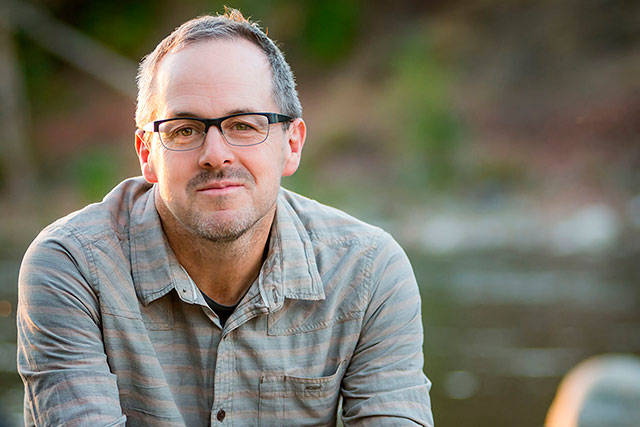Why do words matter? Do words matter? What is the matter with words? For current Washington State Poet Laureate Tod Marshall, words not only matter, they can provide a portal into a larger and more generous context for difficult conversations, for connection and for the unexpected to show up.
During his 2016 to 2018 term as poet laureate, Marshall has crisscrossed the state fulfilling his mission to build awareness and appreciation of poetry. He’s given readings and held workshops in venues that range from correctional facilities to nursing homes, from schools and libraries to small town grange halls. To date, he has held nearly 400 literary events. He has also recently published “WA129,” a collection of 129 poems — one for every year of Washington statehood up to 2018 — that he curated out of 2,400 submissions by both published and unknown poets throughout Washington.
Marshall will host a reading of “WA129” at 6 p.m. Wednesday, Oct. 11, at Vashon Bookshop. Several poets whose work appears in the book will also read: Shankar Narayan, Laura Gamache, Allen Braden, Martha Silano, Paul Nelson and Vashon’s new poet laureate, Merna Hecht. The event will include an open mic, and islanders are invited to bring a poem to share.
In a recent interview, Marshall, who is the Robert K. and Ann J. Powers Endowed Professor in the Humanities at Gonzaga University, reflected on his term, which expires in January. He said it’s been a fascinating journey, particularly at this time.
“Regardless of political spectrum, there is a real hunger for words that matter,” he said. “I am a particularly strong advocate for poetry as a literary expression that can help us dwell in uncertainty. Our historical moment is making people unwilling to do that, and that makes us so polarized.”
Marshall’s recent Seattle Times commentary: “Let’s all take a knee to stand for justice and to pray for a return to decency,” reinforces that point. In the piece, he calls out the danger of devaluing language that “abuses truth and leeches the meaning from words. As Holocaust scholar Timothy Snyder reminds us, without agreed upon language there can be no shared truths. Without shared truths democracy fails.”
Hecht said she admires Marshall not only for his advocacy of poetry, but for his willingness to confront difficult topics.
“Several distinct things struck me about Tod,” she said. “One is his devotion to poetry — not just to writing then reading his poems, but to bringing poems others have written alive through memorizing and reciting them, thus modeling how to embody a poem and give it to others as a gift or offering.”
She was also struck by how Marshall “does not hold back from addressing these troubling times in America and globally as well. He is an ambassador not just for poetry, but for the many ways that words matter in any endeavor toward upholding decency and protecting profoundly important civil and human rights.”
Especially in today’s uncertain political, social and environmental milieu, it takes courage to dwell in uncertainty, to be comfortable with ambiguity, but Marshall says there is great benefit moving beyond a fixed position.
“When is the last time we felt discovery through uncertainty that was not repeating some dogma? It’s reification versus exploring, which a work of art allows. A poem like Robert Frost’s ‘Stopping by Woods on a Snowy Evening’ has lots of ambiguity. I wonder if we can find the generosity to talk about ambiguity — might be an entry to see how to talk about hot topics politically,” he said. “The arts in general help humanize us and understand other people’s perception. If we carry language in our heart, it humanizes us. I believe in finding words that matter.”
The Washington State Poet Laureate program is sponsored by Humanities Washington and ArtsWA.


